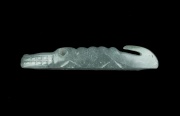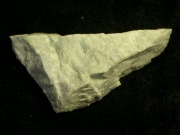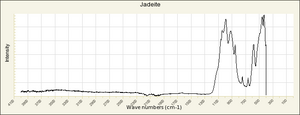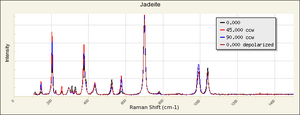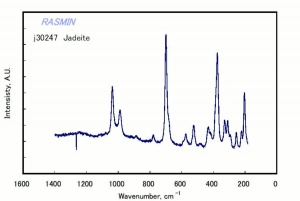Difference between revisions of "Jadeite"
| (9 intermediate revisions by 2 users not shown) | |||
| Line 1: | Line 1: | ||
| − | [[File:1988.1199-SC31014.jpg|thumb|]] | + | [[File:1988.1199-SC31014.jpg|thumb|Crocodile jade pendant<br>MFA# 1988.1199]] |
== Description == | == Description == | ||
| − | + | [[File:pj30247jadeite.jpg|thumb|jadeite]] | |
A very hard stone ranging in color from pale to dark green that is commonly called [[jade]]. Jadeite is composed a sodium aluminum silicate that usually contains small amounts of iron, calcium, and magnesium. The tough stone is hard enough to scratch glass. Though less common than [[nephrite]] (the other jade mineral), jadeite is highly valued for its translucent glassy appearance. Jadeite is primarily found in Japan (Omi, Kataki), China, Myanmar (formerly Burma), New Guinea, the Ural Mountains, Mexico (Celebes), Guatemala, and the U.S. (California). It has been gathered or mined since Paleolithic times. Jade was used for small utensils, carvings, beads, bracelets, and cabochon jewelry. Emerald green color jadeite was highly valued and known as Imperial jade. The grass green variety of jade obtained from near Tawmaw in Myanmar is called Ayah kyauk. Other colors include purple, blue, gray, black, white, red, pink, and orange. When heated to 1000 C, jadeite becomes glassy and may melt. Since the 1980s, some of the finished commercial jadeite (C-jade) stones have been impregnated with resins to improve their transparency. | A very hard stone ranging in color from pale to dark green that is commonly called [[jade]]. Jadeite is composed a sodium aluminum silicate that usually contains small amounts of iron, calcium, and magnesium. The tough stone is hard enough to scratch glass. Though less common than [[nephrite]] (the other jade mineral), jadeite is highly valued for its translucent glassy appearance. Jadeite is primarily found in Japan (Omi, Kataki), China, Myanmar (formerly Burma), New Guinea, the Ural Mountains, Mexico (Celebes), Guatemala, and the U.S. (California). It has been gathered or mined since Paleolithic times. Jade was used for small utensils, carvings, beads, bracelets, and cabochon jewelry. Emerald green color jadeite was highly valued and known as Imperial jade. The grass green variety of jade obtained from near Tawmaw in Myanmar is called Ayah kyauk. Other colors include purple, blue, gray, black, white, red, pink, and orange. When heated to 1000 C, jadeite becomes glassy and may melt. Since the 1980s, some of the finished commercial jadeite (C-jade) stones have been impregnated with resins to improve their transparency. | ||
| − | + | [[[SliderGallery rightalign|Jadeite IR-ATR RRUFF R050220.png~IR-ATR (RRUFF)|Jadeite Raman RRUFF R050220.png~Raman (RRUFF)|jadeiteRS.jpg~Raman (RASMIN)]]] | |
| − | [[ | ||
== Synonyms and Related Terms == | == Synonyms and Related Terms == | ||
jade; Imperial jade; Ayah kyauk; Jadeit (Deut.); jadéïte (Fr.); jadeiet (Ned.); jadeíte( Port.) | jade; Imperial jade; Ayah kyauk; Jadeit (Deut.); jadéïte (Fr.); jadeiet (Ned.); jadeíte( Port.) | ||
| − | + | ==Physical and Chemical Properties== | |
| − | + | * Monoclinic system with fibrous or granular crystalline masses | |
| − | + | * Cleavage = good in two directions (87 and 93 degrees) | |
| − | Monoclinic system with fibrous or granular crystalline masses | + | * Fracture = granular to splintery |
| − | + | * Luster = vitreous to greasy | |
| − | + | * Streak = white | |
| − | + | * Fluorescence = lavender and light green jadeite may have pale white to tan color in LW; usually inert in SW | |
| − | + | * Pleochroism = none | |
| − | + | * Inclusions = often uneven coloring; may have root-like mottling | |
| − | Fluorescence | + | * Max abs = doublet at 691.5 nm with pyroxene band at 437 nm and others at 655, 630 nm |
| − | |||
| − | Max abs = doublet at 691.5 nm with pyroxene band at 437 nm and others at 655, 630 nm | ||
{| class="wikitable" | {| class="wikitable" | ||
|- | |- | ||
! scope="row"| Composition | ! scope="row"| Composition | ||
| − | | Na(Al,Fe) | + | | Na(Al,Fe)Si<sub>12</sub>O<sub>6</sub> |
|- | |- | ||
! scope="row"| Mohs Hardness | ! scope="row"| Mohs Hardness | ||
| − | | 6. | + | | 6.5-7.0 |
|- | |- | ||
! scope="row"| Density | ! scope="row"| Density | ||
| − | | 3.33-3.34 | + | | 3.33-3.34 g/ml |
|- | |- | ||
! scope="row"| Refractive Index | ! scope="row"| Refractive Index | ||
| 1.64-1.69 | | 1.64-1.69 | ||
| + | |- | ||
| + | ! scope="row"| Birefringence | ||
| + | | 0.013 - 0.020 | ||
|} | |} | ||
| − | |||
| − | |||
| − | |||
| − | |||
| − | |||
| − | |||
| − | |||
| − | |||
== Comparisons == | == Comparisons == | ||
| Line 50: | Line 42: | ||
[[media:download_file_461.pdf|Properties of Common Gemstones]] | [[media:download_file_461.pdf|Properties of Common Gemstones]] | ||
| − | + | ==Resources and Citations== | |
| − | + | * E.West Fitzhugh, "Jade" ''The Dictionary of Art'', Grove's Dictionaries Inc., New York, 1996. | |
| − | == | + | * Gem Identification Lab Manual, Gemological Institute of America, 2016. |
| − | + | * Mineralogy Database: [http://www.webmineral.com/data/Jadeite.shtml Jadeite] | |
| − | * ''The Dictionary of Art'', Grove's Dictionaries Inc., New York, 1996 | ||
| − | |||
* Yasukazu Suwa, ''Gemstones: Quality and Value, Volume 1'', Sekai Bunka Publishing Inc., Tokyo, 1999 Comment: Hardness=6.5-7.0; RI=1.666-1.680; Specific gravity=3.34; resin treated stones called B-type | * Yasukazu Suwa, ''Gemstones: Quality and Value, Volume 1'', Sekai Bunka Publishing Inc., Tokyo, 1999 Comment: Hardness=6.5-7.0; RI=1.666-1.680; Specific gravity=3.34; resin treated stones called B-type | ||
| − | |||
* Michael O'Donoghue and Louise Joyner, ''Identification of Gemstones'', Butterworth-Heinemann, Oxford, 2003 Comment: Hardness=6.5-7.0; RI=1.66; Specific gravity=3.33; resin treated stones called C-jade | * Michael O'Donoghue and Louise Joyner, ''Identification of Gemstones'', Butterworth-Heinemann, Oxford, 2003 Comment: Hardness=6.5-7.0; RI=1.66; Specific gravity=3.33; resin treated stones called C-jade | ||
| − | |||
* Jack Odgen, ''Jewellery of the Ancient World'', Rizzoli International Publications Inc., New York City, 1982 | * Jack Odgen, ''Jewellery of the Ancient World'', Rizzoli International Publications Inc., New York City, 1982 | ||
| − | |||
* A.Lucas, J.R.Harris, ''Ancient Egyptian Materials and Industries'', Edward Arnold Publishers Ltd., London, 4th edition, 1962 | * A.Lucas, J.R.Harris, ''Ancient Egyptian Materials and Industries'', Edward Arnold Publishers Ltd., London, 4th edition, 1962 | ||
| − | + | * ''Encyclopedia Britannica'', http://www.britannica.com Comment: "Jadeite." Accessed 21 Aug. 2004 . | |
| − | * ''Encyclopedia Britannica'', http://www.britannica.com Comment: "Jadeite." | ||
| − | |||
* C.W.Chesterman, K.E.Lowe, ''Audubon Society Field Guide to North American Rocks and Minerals'', Alfred A. Knopf, New York, 1979 | * C.W.Chesterman, K.E.Lowe, ''Audubon Society Field Guide to North American Rocks and Minerals'', Alfred A. Knopf, New York, 1979 | ||
| − | |||
* ''Van Nostrand's Scientific Encyclopedia'', Douglas M. Considine (ed.), Van Nostrand Reinhold, New York, 1976 | * ''Van Nostrand's Scientific Encyclopedia'', Douglas M. Considine (ed.), Van Nostrand Reinhold, New York, 1976 | ||
| − | + | * Website: http://www.geo.utexas.edu/courses/347k/redesign/gem_notes/Jade/jade_triple_page.htm | |
| − | * Website | + | * Wikipedia: [https://en.wikipedia.org/wiki/Jadeite Jadeite] (Accessed Sept. 7, 2005 and Dec 2022) |
| − | |||
| − | * Wikipedia | ||
[[Category:Materials database]] | [[Category:Materials database]] | ||
Latest revision as of 12:48, 28 December 2022
Description
A very hard stone ranging in color from pale to dark green that is commonly called Jade. Jadeite is composed a sodium aluminum silicate that usually contains small amounts of iron, calcium, and magnesium. The tough stone is hard enough to scratch glass. Though less common than Nephrite (the other jade mineral), jadeite is highly valued for its translucent glassy appearance. Jadeite is primarily found in Japan (Omi, Kataki), China, Myanmar (formerly Burma), New Guinea, the Ural Mountains, Mexico (Celebes), Guatemala, and the U.S. (California). It has been gathered or mined since Paleolithic times. Jade was used for small utensils, carvings, beads, bracelets, and cabochon jewelry. Emerald green color jadeite was highly valued and known as Imperial jade. The grass green variety of jade obtained from near Tawmaw in Myanmar is called Ayah kyauk. Other colors include purple, blue, gray, black, white, red, pink, and orange. When heated to 1000 C, jadeite becomes glassy and may melt. Since the 1980s, some of the finished commercial jadeite (C-jade) stones have been impregnated with resins to improve their transparency.
Synonyms and Related Terms
jade; Imperial jade; Ayah kyauk; Jadeit (Deut.); jadéïte (Fr.); jadeiet (Ned.); jadeíte( Port.)
Physical and Chemical Properties
- Monoclinic system with fibrous or granular crystalline masses
- Cleavage = good in two directions (87 and 93 degrees)
- Fracture = granular to splintery
- Luster = vitreous to greasy
- Streak = white
- Fluorescence = lavender and light green jadeite may have pale white to tan color in LW; usually inert in SW
- Pleochroism = none
- Inclusions = often uneven coloring; may have root-like mottling
- Max abs = doublet at 691.5 nm with pyroxene band at 437 nm and others at 655, 630 nm
| Composition | Na(Al,Fe)Si12O6 |
|---|---|
| Mohs Hardness | 6.5-7.0 |
| Density | 3.33-3.34 g/ml |
| Refractive Index | 1.64-1.69 |
| Birefringence | 0.013 - 0.020 |
Comparisons
Properties of Common Gemstones
Resources and Citations
- E.West Fitzhugh, "Jade" The Dictionary of Art, Grove's Dictionaries Inc., New York, 1996.
- Gem Identification Lab Manual, Gemological Institute of America, 2016.
- Mineralogy Database: Jadeite
- Yasukazu Suwa, Gemstones: Quality and Value, Volume 1, Sekai Bunka Publishing Inc., Tokyo, 1999 Comment: Hardness=6.5-7.0; RI=1.666-1.680; Specific gravity=3.34; resin treated stones called B-type
- Michael O'Donoghue and Louise Joyner, Identification of Gemstones, Butterworth-Heinemann, Oxford, 2003 Comment: Hardness=6.5-7.0; RI=1.66; Specific gravity=3.33; resin treated stones called C-jade
- Jack Odgen, Jewellery of the Ancient World, Rizzoli International Publications Inc., New York City, 1982
- A.Lucas, J.R.Harris, Ancient Egyptian Materials and Industries, Edward Arnold Publishers Ltd., London, 4th edition, 1962
- Encyclopedia Britannica, http://www.britannica.com Comment: "Jadeite." Accessed 21 Aug. 2004 .
- C.W.Chesterman, K.E.Lowe, Audubon Society Field Guide to North American Rocks and Minerals, Alfred A. Knopf, New York, 1979
- Van Nostrand's Scientific Encyclopedia, Douglas M. Considine (ed.), Van Nostrand Reinhold, New York, 1976
- Website: http://www.geo.utexas.edu/courses/347k/redesign/gem_notes/Jade/jade_triple_page.htm
- Wikipedia: Jadeite (Accessed Sept. 7, 2005 and Dec 2022)
